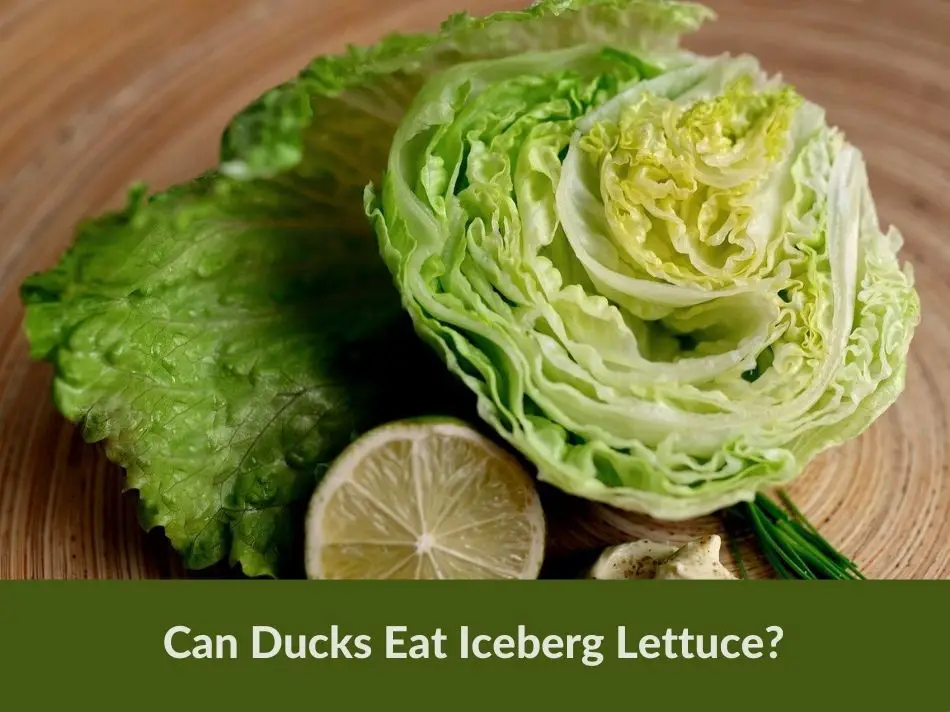Ducks are omnivorous creatures, which means they have a varied diet that includes both plant and animal matter. In the wild, they feast on a smorgasbord of items ranging from small insects, worms, and snails to aquatic plants, seeds, and even small fish. But, can ducks eat iceberg lettuce?
Yes, ducks can eat iceberg lettuce. It’s a safe and hydrating treat for them. It contains several vitamins and minerals, making it good snack for ducks.
In this article we will take a deep dive into the topic of ducks eating iceberg lettuce and the amazing health benefits that comes with it.
How Often Can I Feed My Ducks Iceberg Lettuce?
Considering its low nutritional value, iceberg lettuce should be given as an occasional treat. Once or twice a week is a good frequency. When you do offer iceberg lettuce, ensure it’s fresh and free from pesticides or chemicals.
Can Ducklings Eat Iceberg Lettuce?
Yes, ducklings can eat iceberg lettuce. Make sure to finely chop the iceberg lettuce and always serve it with water. It’s very important to remember that ducklings are growing and that they need a proper diet. Iceberg lettuce should never replace and entire meal.
Iceberg Lettuce Nutritional Value
Iceberg lettuce contains several vitamins and minerals as listed below.
- Vitamin C
- Calcium
- Vitamin K
- Vitamin A
- Folate
- Potassium
[Source]
Is Iceberg Lettuce Healthy for Ducks?
Iceberg lettuce is primarily made up of water, about 95% of its weight. There are some healthy vitamins in iceberg lettuce, but it’s only in small amounts.
- Vitamin C: Essential for ducks, Vitamin C aids in collagen synthesis for wound healing and beak health. It also boosts immunity and acts as an antioxidant. While ducks produce their own, dietary Vitamin C can offer added benefits.
- Calcium: Crucial for bone health and eggshell strength, calcium is a must for ducks. It supports nerve transmission and muscle function. Laying ducks especially benefit from adequate calcium to prevent soft-shelled eggs.
- Vitamin K: Vital for blood clotting, Vitamin K ensures ducks don’t suffer prolonged bleeding from injuries. It also partners with calcium for bone health, ensuring sturdy and healthy ducks.
- Vitamin A: Key for vision, Vitamin A keeps a duck’s eyes sharp, especially in low light. It also promotes healthy skin, feathers, and immune function. A deficiency can lead to vision and feather issues.
- Folate: A B-vitamin, folate supports DNA synthesis and cell division. It’s essential for developing ducklings and aids in adult duck blood cell production.
- Potassium: Important for muscle and nerve function, potassium keeps a duck’s heart rhythm steady and maintains body fluid balance. It’s key for an active and healthy duck life.
How To Feed Iceberg Lettuce To Ducks
- Wash Thoroughly: Always ensure the lettuce is clean and free from pesticides or other chemicals.
- Chop or Tear: For adult ducks, tearing the lettuce into sizable chunks is suitable. For ducklings, finely chop the lettuce to make it easier for them to eat and digest.
- Serve Fresh: Avoid giving wilted or spoiled lettuce. Fresh is best!
- Monitor Consumption: While ducks are generally good at self-regulating, ensure they’re not filling up on lettuce at the expense of their primary food.
- Clean Up: After feeding, remove any uneaten lettuce from their area to prevent it from rotting or attracting pests
Other Veggies Ducks Can Eat
Vegetables is a great way to give ducks snacks that not only tastes good, but are also healthy. Below are a few more than you should consider giving your ducks.
Conclusion
Ducks can indeed enjoy the crisp and hydrating nature of iceberg lettuce, but it’s essential to serve it as an occasional treat because of its low nutritional content. Feeding ducks can be a wonderful experience for adults and children. It is important to note that if you feed ducks at the park, make sure to feed in moderation because the ducks might have been fed treats from other kind people.
To much treats can lead to health issues for the duck.
Disclaimer: The information in this article is for informational purposes only. I'm not an expert or a veterinarian.


